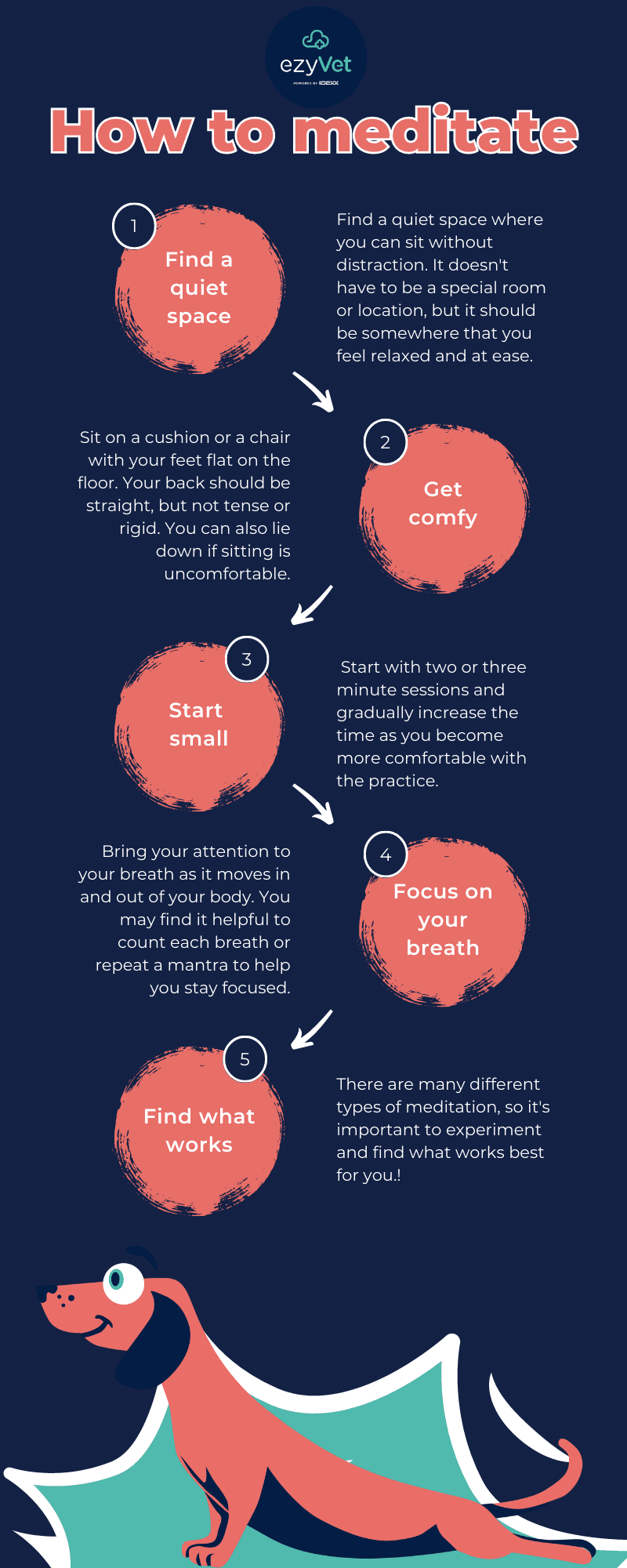
It’s easy to write off meditation as mystical woo-woo; an alternative medicine that occupies the same realm of pseudoscience as salt lamps and quartz crystals.
And, sure, while the benefits are occasionally overblown by overzealous practitioners, the reality is that meditation really can be a useful tool for managing stress, promoting wellbeing, and preventing burnout - all of which are common challenges in the veterinary industry.
In this blog post, we’re going to cut through all the hype and discuss the science-based benefits of meditation, as well as how you can incorporate it into your daily routine.
What is meditation?
Before we go any further, let’s take a moment to talk about what meditation actually is. In a nutshell, meditation is a mental practice that involves training your attention and awareness to achieve a state of calm, clarity, and relaxation. It’s been around in one form or another for millennia, but it wasn’t until recently that it hit the mainstream in Western culture.
These days, public interest in meditation is at an all-time high, fueled by a growing demand for alternatives to prescription drugs, along with easy access to a plethora of meditation apps. The number of US adults who engaged in meditation more than tripled between 2012 and 2017, while mindfulness meditation and training has ballooned to a $1.1 billion industry.
While there are many different types of meditation, most revolve around focusing your attention on a particular object, such as your breath, a mantra, or a visualization, while letting go of distracting thoughts and feelings. Some popular examples of meditation include:
- Mindfulness meditation: This type of meditation involves focusing your attention on the present moment, without judgment or distraction. It can be practiced while sitting, walking, or engaging in other activities. Mindfulness meditation has been shown to reduce stress and anxiety, improve emotional regulation, and enhance overall well-being.
- Loving-kindness meditation: Also known as "metta" meditation, this practice involves cultivating feelings of kindness, compassion, and goodwill towards oneself and others. It often involves repeating phrases or mantras to help generate these feelings. It’s believed that loving -kindness meditation can help improve emotional wellbeing and increase social connectedness.
- Transcendental meditation: This type of meditation involves the use of a mantra, which is repeated silently to oneself. The aim here is to achieve a state of deep relaxation and transcendence. Transcendental meditation has been shown to reduce stress, anxiety, and blood pressure, as well as improve overall wellbeing.
- Body scan meditation: This practice involves systematically scanning the body for sensations, without judgment or distraction. By increasing awareness of bodily sensations and promoting relaxation, body scan meditation aims to reduce stress and enhance wellbeing.
- Breath awareness meditation: This type of meditation involves focusing your attention on the breath, either by counting each breath or simply observing it. The goal is to cultivate a sense of calm and relaxation. Breath awareness meditation has been shown to reduce stress, anxiety, and blood pressure, as well as improve cognitive functioning.
The benefits of meditation for veterinary professionals
While meditation isn't a magical panacea and shouldn’t be used as a substitute for conventional care, it can be a useful and low-risk tool for reducing stress and improving your overall wellbeing.
Here are some of the key benefits of mindfulness meditation for veterinary professionals, supported by the most thorough meta-analyses we could track down:
- Reduced stress and anxiety: Studies have found that regular meditation can help reduce symptoms of stress and anxiety. This is particularly important for those in the veterinary industry, who may be dealing with emotionally charged situations on a daily basis. A 2015 meta-analysis published in JAMA Internal Medicine found that mindfulness meditation programs can provide small to moderate reductions in multiple negative dimensions of psychological stress, including anxiety, depression, and pain.
- Improved focus and concentration: Meditation has been shown to improve cognitive function, including attention, memory, and decision-making. This can be especially helpful for veterinarians and technicians who need to be able to focus on complex medical procedures and diagnoses. In a 2020 meta-analysis published in Consciousness and Cognition, researchers found that mindfulness meditation had a small positive effect on attentional functioning, memory, executive functioning, and higher-order function.
- Better sleep: Poor sleep is a common issue for those in high-stress roles - including veterinary professionals! - but meditation can help improve sleep quality and duration. Getting enough rest is crucial for overall health and well-being. According to the findings of a 2018 meta-analysis published in Annals of the New York Academy of Sciences, mindfulness meditation may be able to improve sleep quality in a variety of clinical populations with sleep disturbance.
- Reduced cortisol levels: Cortisol is a hormone released in response to stress, and high levels of cortisol can lead to negative health effects such as high blood pressure, impaired immune function, and weight gain. A 2016 meta-analysis found that mindfulness-based interventions such as meditation may have a role to play in reducing cortisol levels.
How to get started with meditation
If you're interested in trying meditation, here are a few tips to get you started:
1. Find a quiet space
To start meditating, find a quiet space where you can sit without distraction. It doesn't have to be a special room or location, but it should be somewhere that you feel relaxed and at ease. You may want to dim the lights, light a candle, or play soft music to create a calming atmosphere.
2. Get comfortable
Once you've found your space, sit down in a comfortable position. You can sit on a cushion or a chair with your feet flat on the floor. Your back should be straight, but not tense or rigid. You can also lie down if sitting is uncomfortable or difficult.
3. Start small
When you're first starting out, it's best to begin with just a few minutes of meditation each day and gradually work your way up to longer sessions. Start with two- or three-minute sessions and gradually increase the time as you become more comfortable with the practice.
4. Focus on your breath
One of the most common meditation techniques is to focus on your breath. Simply bring your attention to your breath as it moves in and out of your body. You may find it helpful to count each breath or repeat a mantra to help you stay focused.
5. Experiment with different types of meditation
There are many different types of meditation, so it's important to experiment and find what works best for you. Some people prefer guided meditations, which can be found on meditation apps or websites. Others prefer to meditate in silence, with no guidance or distractions.

Overcoming common challenges with meditation
Starting a meditation practice can be challenging, but here are a few tips for overcoming common barriers:
- Difficulty staying focused: It can be challenging to maintain your focus during meditation, especially if your mind tends to wander. To overcome this, try starting with shorter meditation sessions and gradually increasing the length as your focus improves. You can also experiment with different meditation techniques, such as guided meditations, to help keep your mind on track.
- Physical discomfort: Sitting in one position for an extended period of time can cause physical discomfort, such as stiffness or pain in the back, neck, or legs. Stay comfy by sitting on a cushion or using a chair to provide support. You can also experiment with different sitting positions, such as cross-legged or kneeling, to find what works best for you.
- Lack of motivation: It can be challenging to stay motivated to meditate, especially if you don't see immediate results. Remember, mindfulness is a marathon, not a sprint. Stay motivated by setting yourself achievable goals, such as meditating for five minutes a day for a week. You can also try finding a meditation group or partner to help keep you accountable.
- Busy schedule: Finding time to meditate can be difficult, especially if you have a busy schedule. To overcome this obstacle, try scheduling your meditation practice at a specific time each day, such as first thing in the morning or right before bed. You can also try integrating mindfulness into your daily routine, such as by practicing mindful breathing while waiting in line or brushing your teeth.
Conclusion
Meditation can be an effective tool for reducing stress and improving overall wellbeing. By incorporating meditation into your daily routine, you can reduce stress and anxiety, improve focus and concentration, and get better sleep. Give it a try and see how it can benefit you!
Need more mindfulness in your life? Check out Mindful May, an ezyVet initiative dedicated to promoting wellbeing and self-care in the veterinary industry.